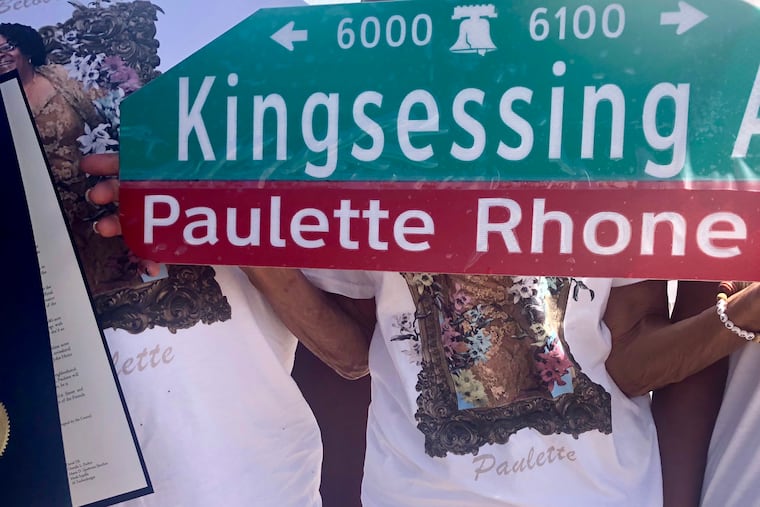Across the street from the abandoned cemetery she saved, a Philadelphia activist gets her due — and a street sign
On Saturday, city officials unveiled a tribute to longtime Philadelphia activist Paulette Rhone at 61st and Kingsessing Avenue, where she spent countless hours, renaming a portion of Kingsessing "Paulette Rhone Place."

In the eight years since Mount Moriah Cemetery was abandoned, Paulette Rhone heaved thousands of busted tires into the trash, mowed grass so tall it rivaled her 5-foot frame, and summoned her famous ferocity into ordering littering contractors to pick up every piece of garbage they had dumped on the grounds.
To those who knew her, or even just passed by 61st Street and Kingsessing Avenue in Southwest Philadelphia enough, Rhone defined Mount Moriah and cared deeply for the 164-year-old cemetery that spans part of Philadelphia and Delaware County and houses more than 100,000 graves. It was, by all accounts, her project, her refuge, the place she had buried her husband, Gilbert, 25 years ago after he died of a heart attack. She wanted more time to transform its 200 acres into an urban oasis as she led a restoration effort by the nonprofit Friends of Mount Moriah Cemetery, but in February, she, too, died of a heart attack. She was 64.
But steps were taken Saturday to ensure she will not be forgotten in the place over which she doted: the installation of a street sign that reads “Paulette Rhone Place.”
“Paulette would say from time to time: ‘There will be a time when I am gone but I will still be here, meaning Mount Moriah,’ " Ken Smith, newly elected president of Friends of Mount Moriah, said Saturday, speaking at a crowded street-side memorial for Rhone during which the tribute sign was unveiled. "She loved Mount Moriah.”
Sitting atop a wooden post at the corner of 61st and Kingsessing, the sign overlooks the cemetery. Far back, close to a tree-lined pathway, she is buried with Gilbert in a double-deep grave on a sunny plot. “Loving parents,” the tombstone reads.
Being buried with her husband was one of Rhone’s long-awaited wishes. Another is a work in progress — to keep Mount Moriah, home to soldiers from the Revolutionary War to World War II, as a clean, open green space for the community.
In Rhone’s honor, council members Kenyatta Johnson and Jannie Blackwell and state Sen. Anthony Williams said they would create a task force to promote environmental restoration and conservation.
“I can honestly say she was a woman on a mission,” Johnson said.
Those close to her described her in similar ways: She was unafraid, with a tireless work ethic and a love for nature, believing it to be healing and restorative. Just as she was kind, friends and coworkers said, she was relentless, demanding commitment from those around her.
“She was the catalyst. She was the motivator. She was the mom,” said Bill Warwick, vice president of the board of directors for Friends of Mount Moriah Cemetery, the nonprofit Rhone directed. “She smacked you when you needed to be smacked and hugged you when you needed to be hugged.”
Over eight years, she revitalized Mount Moriah, Warwick said, rendering the once-overgrown, vandalized property into a cemetery that’s now also recognized as an arboretum.
“This woman was extraordinary,” Williams said. “We love her, we miss her, and, God willing, we will see her again.”